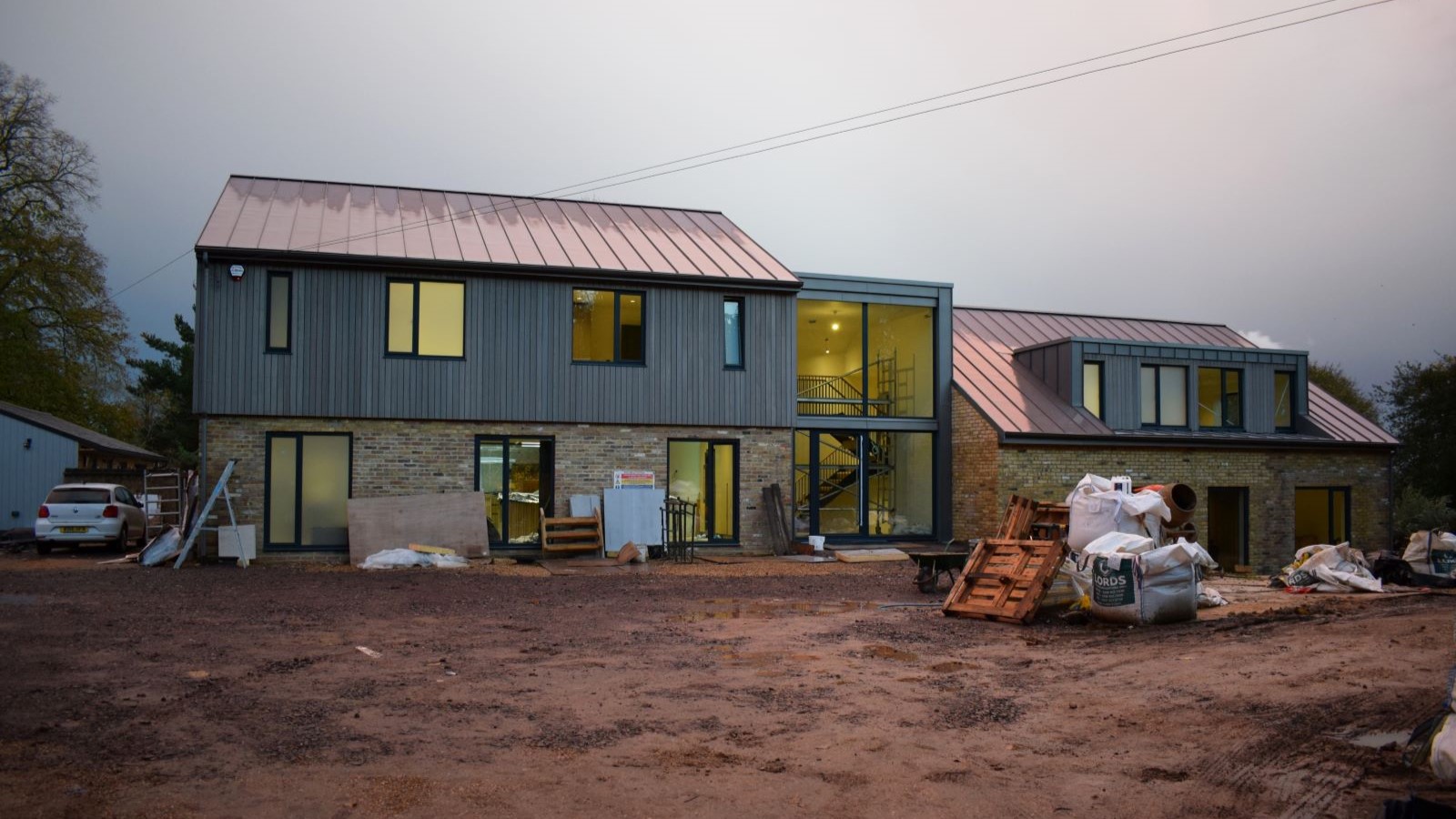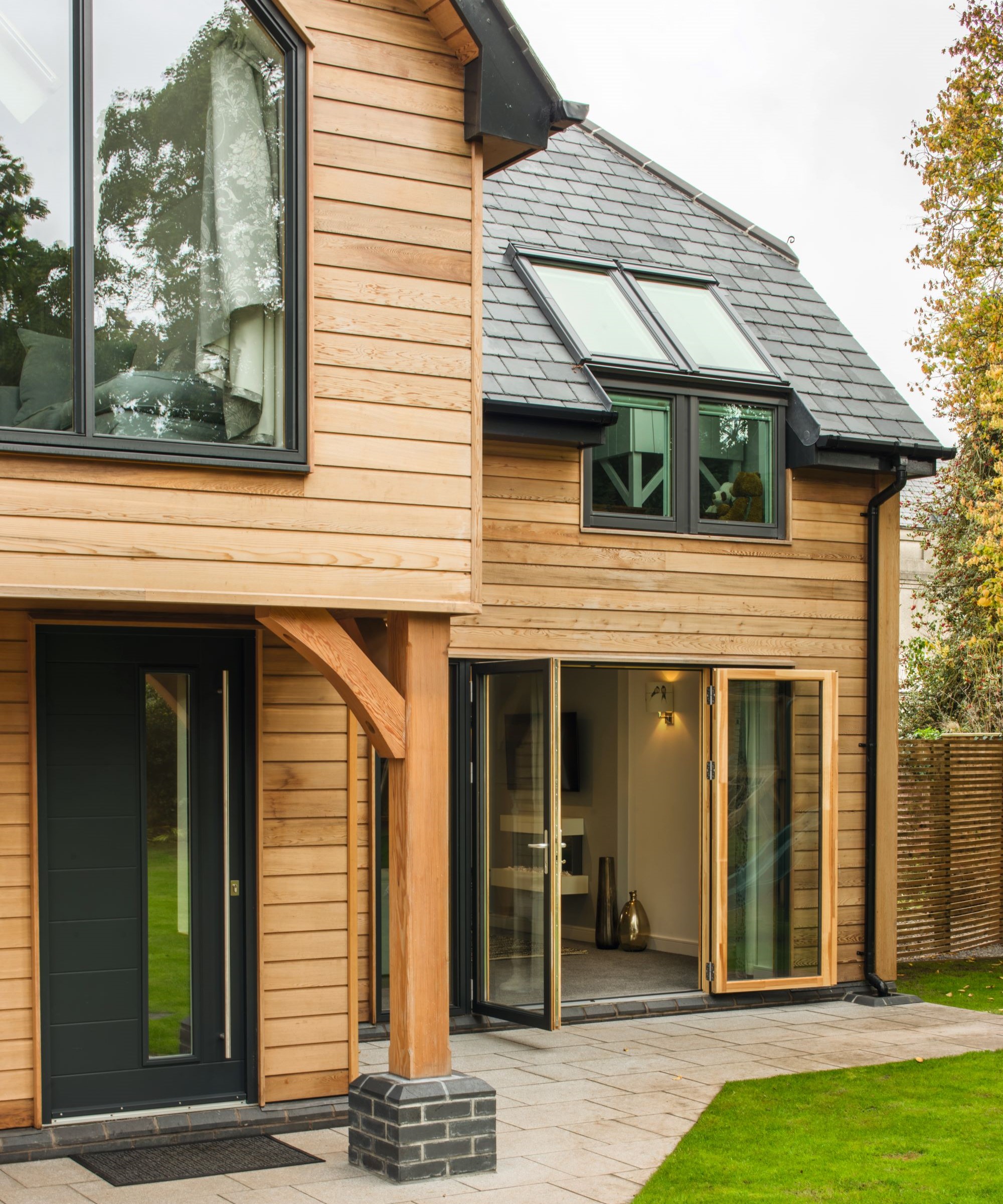I'm a self build expert and this is how to stop your project going over budget
Every penny counts when building your own home, so here’s how to ensure you keep your project spend on track

- Get expert advice early on
- Create a realistic and detailed budget
- Budgeting is an ongoing process
- Always have a contingency
- Plan for smooth cash flow
- Stick with tried and tested build methods
- Invest in skilled tradespeople
- Take on some work yourself
- Source your own materials
- Don’t change your mind
- Make timely decisions
- Focus on the interfaces between things
- Manage the waste
- Run a happy site
Building your own home is one of the most rewarding projects you can undertake. It’s a chance to create a unique and individual home with all the personal touches that will make it feel yours.
But while it’s incredibly rewarding, taking on a building project is a financial challenge. Without careful planning and constant oversight, the costs can quickly spiral out of control, turning the self build dream into a bit of a nightmare.
Staying on budget is not just about keeping a close eye on your expenses; it requires careful planning and organisation. By taking the following approach, building your own home shouldn’t break the bank, and if you do it right you should have money left over for those finishing touches that make a house a home.
Get expert advice early on
Before you even start thinking about putting pen to paper and creating a design for your new home, you first need to get some expert advice. It’s crucial to have a professional’s perspective on what’s possible with the budget you can afford.
Ideally, you need to get the DNA of your project right, and ensure the budget isn’t fundamentally flawed. Consulting professionals doesn’t mean you have to commit to an architect or builder straight away.
Attending Homebuilding and Renovating shows, for example, gives you access to various industry experts offering free advice. Keep in mind that each expert may offer a different view on costs, so gathering multiple opinions helps you form a balanced understanding.
For example, a financial adviser can help you determine what you can realistically afford, while a surveyor or project manager can give clearer insights into potential costs and how to stretch your budget.
Create a realistic and detailed budget
Once you’ve gathered expert input, the next step is creating a detailed budget. One of the first questions you’ll probably ask yourself is: “How much does it cost to build a house?” The good news is that building your own home is usually cheaper than buying one from a developer. But to achieve these savings, you need a realistic and thorough budget from the start.
When putting your budget together, be specific about what you want to build. Bear in mind that the size and complexity of your project will be the biggest influence on costs. A modest two-bedroom house, for example, will cost far less than a sprawling, multi-storey mansion.
The trick is to be ambitious but also realistic so you don’t plan a house that’s bigger or more complex than you can afford. Make sure you account for all the “hidden” costs, such as professional fees, landscaping, outbuildings, and even interior furnishings as they can quickly add up.
Budgeting is an ongoing process
Creating a budget at the start is essential, but it’s just as important to monitor it throughout your build. Treat your budget as a living document that you revisit regularly to make sure everything is still on track.
Even the most well-planned projects can face unexpected expenses. Maybe a material you budgeted for is suddenly more expensive, or you find a contractor hasn’t included everything you expected. By regularly reviewing your budget, you can address small overspends before they become bigger problems.
Always have a contingency
No matter how well you plan, surprises are inevitable in any building project. Costs often increase at the foundation stage, and as we’ve seen in recent years, material prices can rise unexpectedly.
This is why a solid self build budget should always include a contingency fund. It’s a good idea to set aside at least 10% of your total budget for these unexpected expenses, but if you’re building something particularly challenging or risky, it might be better to allocate up to 20%.
It's better to be safe than sorry, and if you don’t end up needing all of it the surplus could fund some upgrades or finishing touches.
Plan for smooth cash flow
Keeping within budget is not just about how much the project will cost – you also need to plan when the money will be spent. Good cash flow is essential to keep the project moving forward.
The last thing you want is to be halfway through the build and realise you don’t have enough money to pay the contractors or buy materials for the next stage. If you’re relying on a self build mortgage, your lender will release funds in stages, so you need to be clear on when those payments will arrive so you can pay the bills and keep things on track.
Stick with tried and tested build methods
While it’s exciting to think about using cutting-edge construction techniques or new materials, pushing the boundaries can introduce uncertainty into your budget. Stick with reliable, proven building methods as these will prove easier to manage. Trades will be very familiar with what’s needed and will be able to price accordingly.
For example, timber frame and SIPs constructions are popular choices for self builds because it reduces the amount of onsite work, offering predictable costs and timelines. Much of the work is done off-site, meaning you can avoid delays caused by bad weather or other unforeseen factors. Remember, the more predictable your build, the easier it will be to stay on budget.

Invest in skilled tradespeople
While it’s tempting to save money by hiring the cheapest contractors or doing the work yourself, this can backfire, costing more in the long run. Skilled tradespeople get the job done right the first time, reducing the risk of mistakes and delays.
When hiring tradespeople and finding a builder, it’s worth spending a little more to get someone you know is competent and reliable. Ask for references and check their previous work and if they look like they wouldn’t care less if things go wrong, run a mile.
Take on some work yourself
If you’re handy and have the time, one of the best ways to save money is to do some of the work yourself. While you should leave technical jobs like wiring and plumbing to the experts, there are tasks you can handle to reduce labour costs .
Painting, decorating, laying tiles, or even installing basic fixtures can all be managed by someone with reasonable DIY skills. It might take you a little longer than a pro, but the savings can add up. Just make sure you don’t overestimate your abilities – doing it wrong could end up costing more to fix than it would have to hire a professional in the first place.
If you’re well-organised, you might even consider managing the entire project yourself. Being your own project manager can save a considerable amount of money, especially if you’re confident in your planning and organisational skills. Just make sure to consult your tradespeople if you’re ever unsure – they have a vested interest in making sure the build runs smoothly and so will be happy to help.
Source your own materials
Another way to save is by sourcing materials yourself. Contractors may offer competitive quotes, but they won’t have time to hunt for special deals or alternative suppliers.
With a little research, you could find bargains that fit your budget. However, be careful, while cheaper materials can cut costs, you don’t want to compromise on quality.
Don’t change your mind
One of the quickest ways to blow your budget is by making changes once the build has started. While it’s easy to get swept up in the excitement and start adding extras, these changes almost always cost more than expected. While some minor adjustments may be unavoidable, try to stick to your original plans as closely as possible.
Make timely decisions
Poor or delayed decision-making is one of the main reasons budgets overrun. Whether it’s deciding on the layout, materials, or finishes, having a clear vision of what you want before construction begins can prevent costly last-minute changes.
If you do need to make changes, try to finalise them before construction begins. Altering designs or materials once the build is underway is not only expensive, but can also cause delays and risk claims from contractors.
Focus on the interfaces between things
Costs often sneak in at the points where different materials or trades come together. Take, for instance, where cladding meets external joinery or how those materials attach to the structure.
It’s not that contractors intend to overlook things – sometimes it’s just one trade assuming the other will handle a detail, and it falls through the cracks.
To avoid surprise costs, it’s important to understand how different trades interact and where materials meet. Make sure nothing is overlooked, because any missed details are unlikely to be in the budget, leaving you to cover the extra expense.
Manage the waste
Waste management is an often-overlooked part of budgeting on a building project. Ordering too much material is costly – not only because you’ve paid for something you won’t use, but also because you have to store it and, eventually, dispose of it.
To minimise waste, keep a close eye on the quantities of materials being ordered, making sure you only order what’s needed. Also, avoid having a skip sitting around the site – tradespeople might be tempted to “tidy up” by throwing away perfectly good materials. Instead, set aside an area for storing reusable materials and have contractors remove their own waste. You might be surprised how much you can repurpose or even sell to other self builders.
Run a happy site
It’s easy to forget that the working conditions you create on-site can affect the outcome of your project. Creating a good working relationship with your trades and contractors can go a long way toward keeping your build on budget.
A contractor who feels respected and appreciated is more likely to go the extra mile and will be less likely to demand additional payments for minor changes or extras. If you keep the site tidy and well organised, and provide contractors with everything, they need to do their job efficiently, you’re more likely to get a quality job done on time and within budget.
Keeping your self build project on budget boils down to careful planning, staying on top of spending, and making informed decisions. Start with a realistic budget, bring in the professionals where needed, and be flexible without straying too far from your original plan. Regularly monitor your budget, and always set aside extra funds for unexpected surprises.
Ultimately, keeping within budget isn’t about cutting corners or pinching pennies – it’s about staying organised and fostering commitment from everyone involved. That way, you’ll end up with a home you love, without breaking the bank.
Self builders often choose to manage a self build themselves to save money and stay on budget. Doing so can be a good idea but only if you are competent and handle it in a well-organised way, taking account of all the different trades and their timings, as well as costings.
Get the Homebuilding & Renovating Newsletter
Bring your dream home to life with expert advice, how to guides and design inspiration. Sign up for our newsletter and get two free tickets to a Homebuilding & Renovating Show near you.
Mark Stevenson has worked as a construction professional for over 30 years and following an extensive career in housebuilding. He is currently chief operating officer for Custom Build Homes and chair of the National Custom and Self Build Association. He previously worked as managing director for Potton, helping self builders build their own homes.
Whilst Mark describes himself as a ‘professional builder’ as a result of his career in housebuilding and timber building system manufacturing, he has specialist knowledge of timber construction and extensive expertise in finding land and project management.
He regularly shares his knowledge at Homebuilding & Renovating Shows and and coaches self builders about how to build their own homes. Aside from Mark’s professional career, his skills also extend to practical building knowledge as a skilled joiner, hands-on renovator and serial self-builder of his own development projects.
He is also Vice Chair of industry body, the Structural Timber Association.

